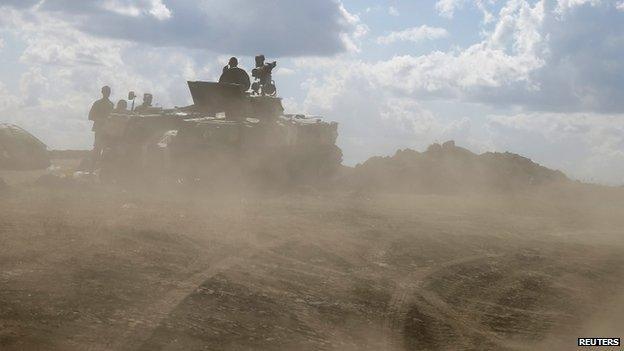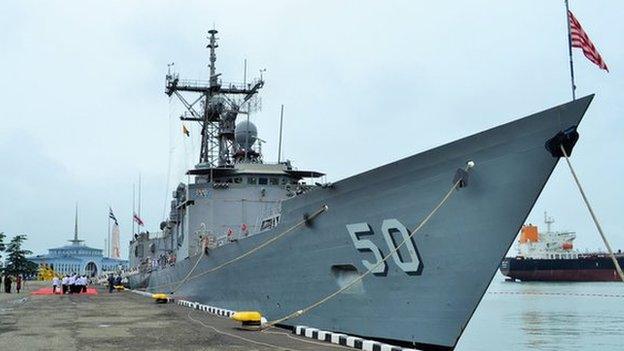Nato rapid response force: Plan to boost Europe presence
- Published
Nato Secretary-General Rasmussen: "We must face the reality that Russia does not consider Nato a partner"
Nato is to agree on a rapid response force of several thousand troops to protect Eastern European members against possible Russian aggression, says its secretary general.
Anders Fogh Rasmussen said the force could be deployed within 48 hours.
The new measures are set to be approved at a Nato summit in Wales this week.
It comes after Nato members in eastern and Baltic states voiced concern over Russia's regional ambitions in the wake of the continuing Ukraine crisis.
Mr Rasmussen said military equipment and supplies would be pre-positioned in member states in the east as part of a Readiness Action Plan, enabling the quick deployment of the force.
It would make the Western military alliance a more visible presence in Eastern Europe and "fitter, faster and more flexible to adjust to all kinds of security challenges," he told reporters in Brussels on Monday.

Analysis - Jonathan Marcus, BBC News, diplomatic correspondent

Ukraine has asked for more military supplies from Nato to help deal with pro-Russia separatists in the east
In response to the Ukraine crisis, Nato is to establish a new rapidly deployable "spearhead" force capable of being deployed within a matter of only two days.
This is all part of a much wider overhaul of Nato's response forces which Nato officials say is not solely linked to Ukraine; it will be capable of deploying anywhere within the alliance to give immediate reassurance and a demonstration of alliance resolve.
For such a force to be effective there will have to be regular exercises and Nato officials note that headquarters and other so-called "enablers" - key logistics elements for example - will need to be based closer to areas of potential threat - for that read closer to Nato's eastern and southern borders. Fuel stocks and ammunition may also need to be pre-positioned further east.

The Nato chief insisted that the plans would not breach the 1997 Nato-Russia Founding Act, external, which forbids the presence of permanent bases in eastern and central Europe.
Mr Rasmussen said the new measures were being taken "not because Nato wants to attack anyone but because the dangers and the threats are more present and more visible... we will do what it takes to defend our allies".
The proposed force would be composed of several thousand troops from 28 Nato members on a rotating basis, Mr Rasmussen told reporters in Brussels.
The two-day summit in Newport, which starts on Thursday, is expected to be dominated by the Ukraine crisis.
- Published3 June 2014

- Published6 February 2015